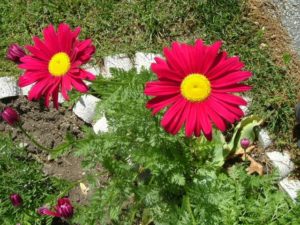Gerbera Daisy Care – Tips On How To Grow Gerbera Daisies
Gerbera daisies (Gerbera jamesonii) are commonly grown for their bright and cheerful daisy-like flowers. They originate from South Africa and come in various sizes and colors including pink, yellow, salmon, orange and white, with flower sizes anywhere from 2 to 5 inches across. There are many gerbera daisy cultivars available, bred for their color and flower shape (single, double or multiple petals). For better results in how to care for a gerbera daisy plant, choose a variety that is compact, as flower stems will be sturdier on compact plants, and one that suits the pot size or planting bed you will be growing in.
How to Grow Gerbera Daisies
Growing gerbera daisy plants is possible from seed, seedlings or division. Seed is the cheapest method, but seeds must be sown immediately as they lose viability quickly after opening. Keep in mind seeds may also not be true to form. Growing from seedlings or divided plants is easier and you can be sure what the flower type will be. If you have older plants, the crowns can be lifted and divided in early spring. Remove lower leaves and replant immediately.
Gerbera Daisy Planting Guide
Plants thrive in a position with full sun and sandy soil. A little compost added at planting will encourage good flower growth. With newly sown seeds, a well-draining propagation mix is a must, as is bright indirect light. Crown rot is a common problem with gerbera daisies, which is  caused by planting the crowns too deeply. The crown should be visible above the soil and allowed to dry out between each watering. Plants can be mulched, but care must be taken that mulch does not cover the crown. If you live in a wet or humid climate or have heavy soil, try planting in well-draining pots instead.
caused by planting the crowns too deeply. The crown should be visible above the soil and allowed to dry out between each watering. Plants can be mulched, but care must be taken that mulch does not cover the crown. If you live in a wet or humid climate or have heavy soil, try planting in well-draining pots instead.
How to Care for a Gerbera Daisy Plant
Gerbera daisies are susceptible to fungal diseases, although older varieties less so. Fungal sprays do not generally prevent crown rot, so correct planting and watering are essential for gerbera daisy care. Make sure you plant them with adequate spacing and in high light areas. Water in the morning so leaves can dry out during the day to lessen the risk of rot and fungal diseases. Gerbera daisy care can also be enhanced by using a micro-nutrient liquid fertilizer such as a seaweed or fish emulsion. Keep an eye out for caterpillars and leaf miners too. Spray, if needed, with an organic spray such as pyrethrum or neem oil. Growing gerbera daisies can have some challenges, but it is a wonderful reward when those big, happy flowers bloom.
